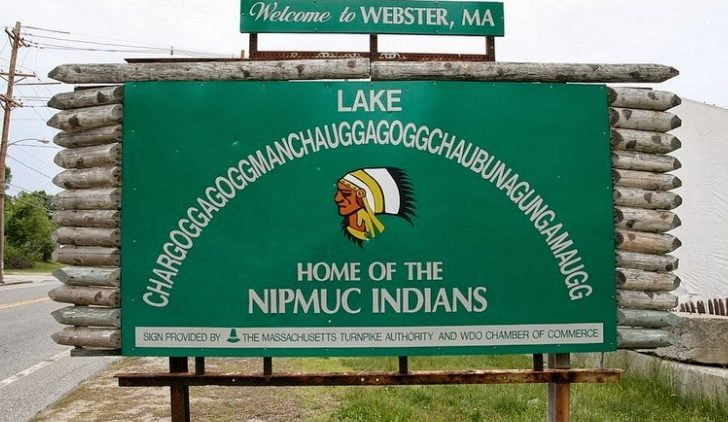
#TechnicalTests: Do Keywords In Over-Length Page Titles Help Rankings?
#TechnicalTests: Do Keywords In Over-Length Page Titles Help Rankings?
Do keywords included in page titles over Google’s 600 pixel display limit count for anything?
(I don’t have time for this, just take me to the answer)
Page titles are still one of the main on-page elements that help determine the keywords a page will rank for, and optimising them for both search engines and SERP CTR can really make or break a page’s organic performance.
Page titles: Know your limits
Google has set limits for the length of page title it will display based on the layout of their SERPs, and though this has changed a few times in the past, it’s been settled at around 50-60 characters (including spaces) for a while now.
This character limit is often described as a range, due to the fact that not all characters are created equal, so wider characters like ‘o’ and ‘m’ will take up more space than narrow boys like ‘i’ and ‘j’.
If you want to really get into the detail, the maximum page title length is better expressed in terms of pixels. There are a few tools that go into this level of detail (including Screaming Frog), so if you really want to get precise with your title tags, a limit of 600 pixels is what you want to aim for.
Over the limit
Creating page titles over this limit will result in Google cutting off everything after the 600 pixel limit. This is pretty common and can be seen in many SERPs in the wild:
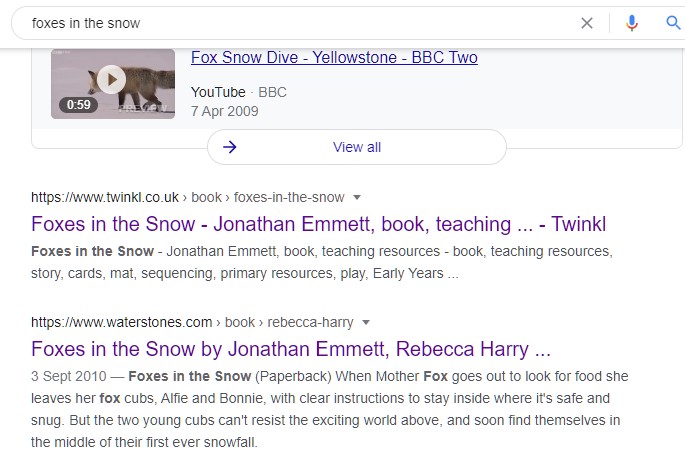
In both instances above, the page titles specified by the twinkl.co.uk and waterstones.com are just slightly over length, and are being truncated by Google in the SERPs.
Crawled but ignored?
So, if Google is only displaying 600 pixels of the page title in its SERPs, does that mean it’s only crawling the first 600 pixels of the title in the page code? This seems pretty unlikely, and it’s much more logical that the whole page title is crawled, in its entirety, and is then truncated when displayed in the SERPs.
But if this is the case, does Google’s ranking algorithm crawl the whole page title and only use the first 600 pixels to determine what the page is about and rank it accordingly? Or, are words included after this 600 pixel limit used to help rank pages, and if so, to what degree?
We thought we’d run a couple of tests to find out.
Our range of over-length page title tests
We decided to run a couple of tests to look at the following:
- Would a new, completely made up keyword, only used in the post-600 pixel part of the page title cause the page to be indexed for that keyword?
- If so, could we get a different page to rank for a non-made-up keyword in the same way, and how well would this page rank vs competitor pages?
- And, if so, how would the rankings of this page fare compared to a similar piece of content where the non-made-up keyword appears at the front of the page title?
Test 1: Can a page rank for a keyword only found in an over-length page title?
This test was pretty easy to setup. We just needed a keyword with 0 current competition, i.e. a completely made-up word, not currently known to Google. We found one in the term ‘barftromble’:
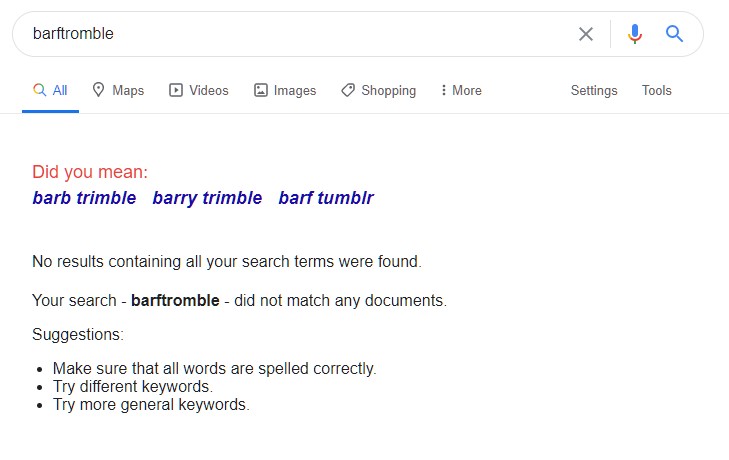
Next, we created a page of content on one of our test domains. The content and no other page elements would contain the term ‘barftromble’, so we’d know if its inclusion in the page title was causing it to rank.
Rather than writing out a page of content, we looked to our robot pals for help with the handy auto-generated story-creator site https://www.plot-generator.org.uk/. We fed in a couple of key character names, places, events and descriptions and it churned out a pretty fantastic short story, which you can read here: http://www.pnettest15.co.uk/the-bendy-map/.
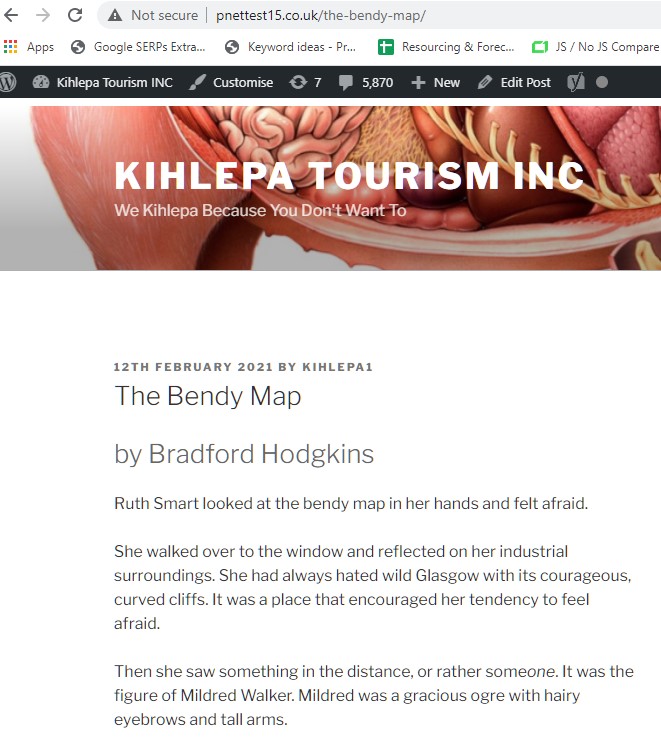
With this done, we simply created a page title that was way over-length and contained our keyword right near the end. We used the fantastic Search Wilderness meta data length checker for this – it uses pixel limits and shows you where a title would be cut off in Google so is my go-to for testing title lengths:
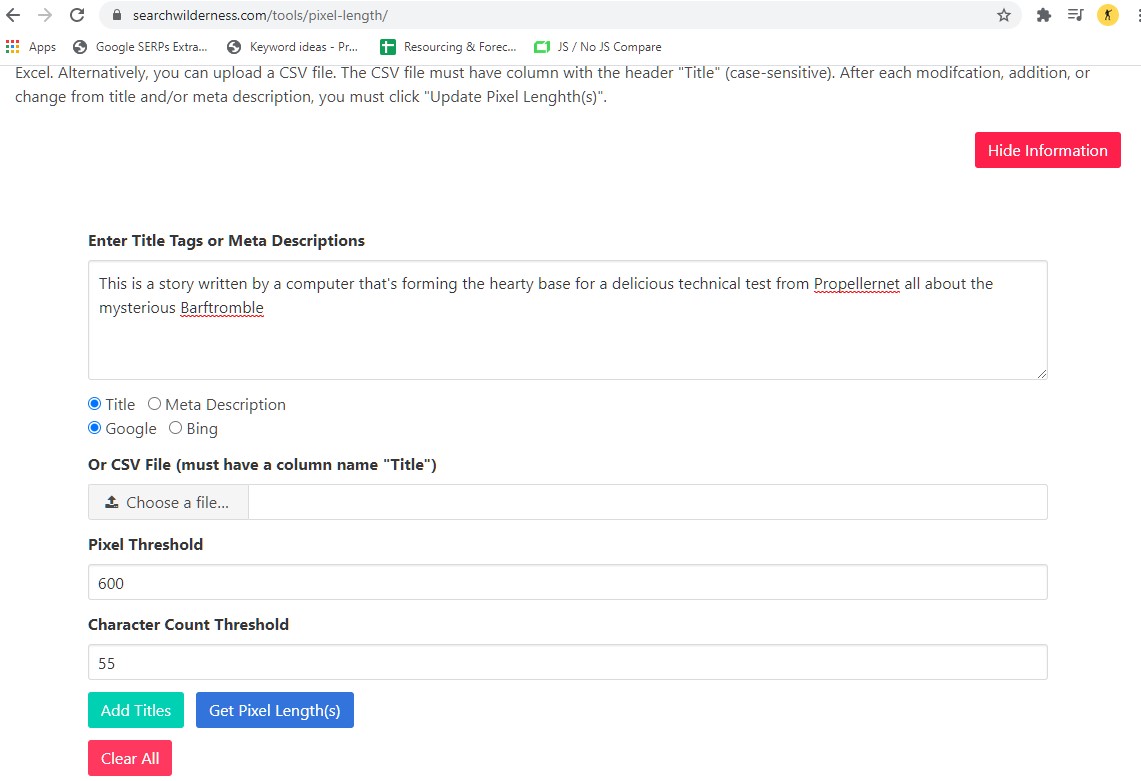
It was quite far over length:
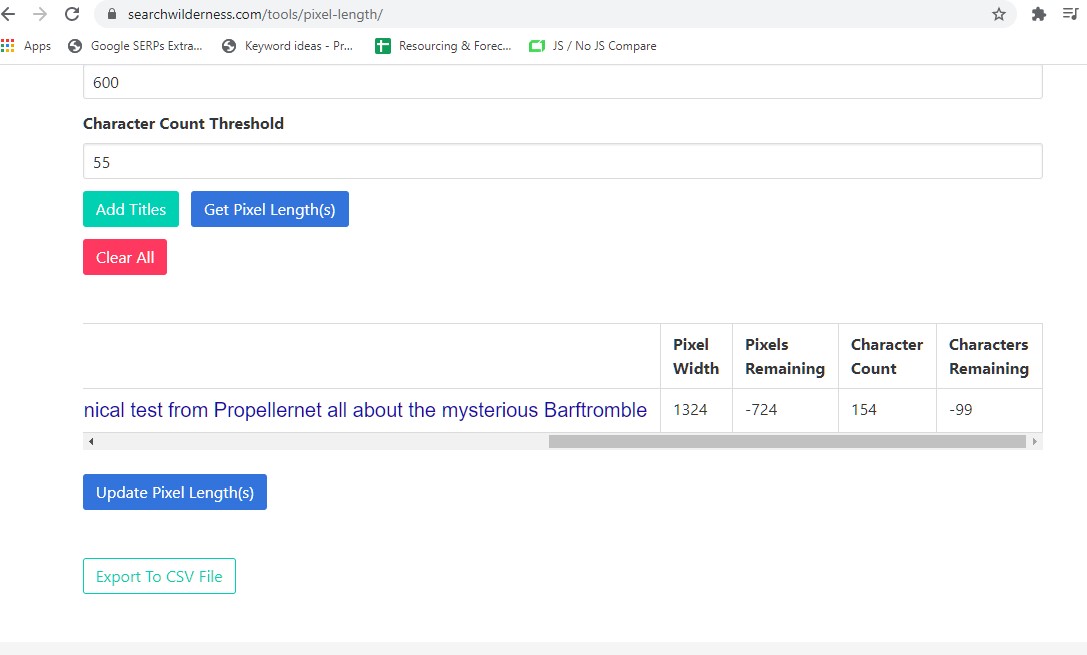
All that was left now was to wait for Google to index the page, and then once it was indexed, see if it would return any results for ‘barftromble’. To speed this process up a bit we used Google Search Console’s URL Inspection tool to get the page crawled and request indexation:
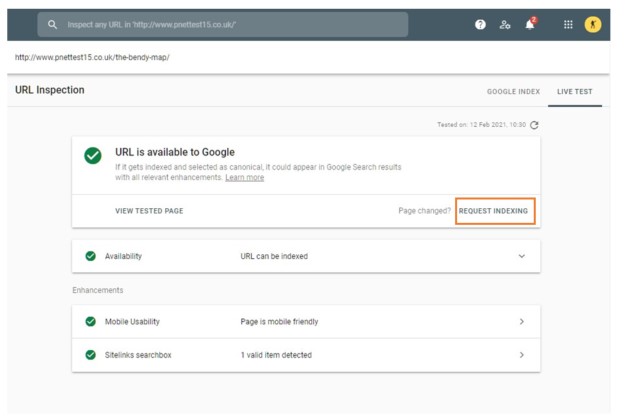
Test 1: The results
The new page was indexed by Google pretty quickly, so now we just had to see if there were now any results for ‘barftromble’…
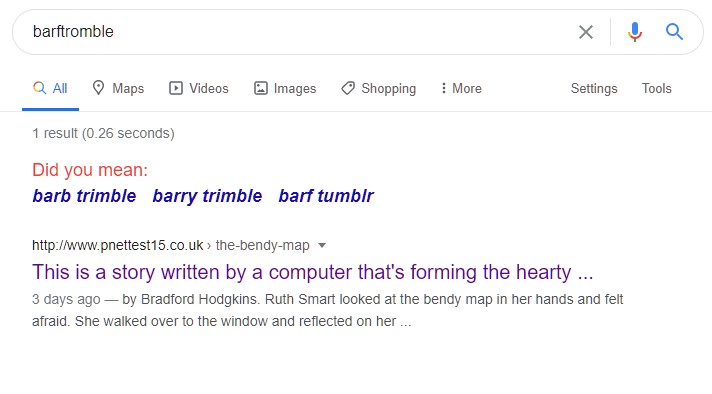
There we have it, Google has taken the keyword from the very end of a 1,324 pixel page title and used it to match our page to the user’s search.
Test 2: Can a page rank for a keyword only found deep into an over-length page title?
So, we know Google is parsing the content in the part of page titles that are over-length, and can use it to rank pages. However, the next question is: ‘does this actually help improve rankings vs competitors?’
To test this, we needed to run a similar experiment but using a keyword that actually had some (but not too much) competition, so we could see if the value placed in this overly long title tag was actually sufficient to compete with run of the mill sites.
The test site had previously been used for an experiment on the value of outbound links which resulted in us creating some high-quality content on Estonian pig-farming villages, so we decided to use another Estonian village as the keyword for this test. After all, it’s important to ensure a site’s content is thematically similar.
We settled on the village of Eassalu which only yields 73 results, and lacks some of the larger travel brands in its SERPs. We figured we might be able to compete here with only a keyword in the page title, and a fascinating story about a teapot.
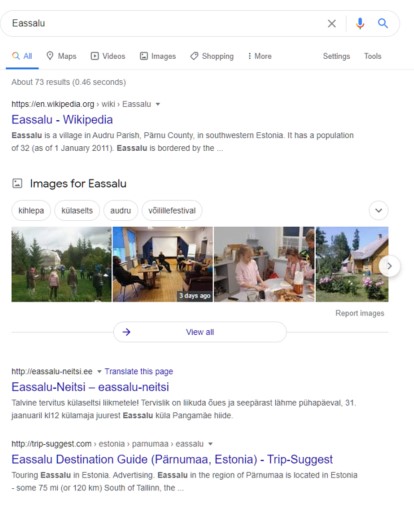
Again, we got this new test page crawled by Google and requested indexation, and waited for it to storm the SERPs and further strengthen our test site’s grip on the ‘obscure Estonian village’ market.
Test 2: Results
Our new page was indexed pretty quickly, but a quick check of the SERPs left us bereft of the incredible rankings we were hoping for:
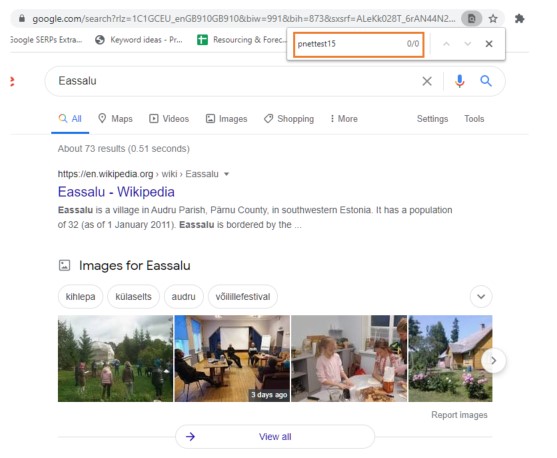
Our test domain was nowhere to be found. We waited a couple of weeks, but sadly could not break into those 73 results.
We had initially planned a 3rd test to try and understand how much of an impact the keyword’s position within the page title was having, by publishing a similarly random piece of content but with the keyword at the front of the page title instead.
Sadly, this became fairly pointless once it became clear that our page wasn’t going to be able to outrank any competitors based on just a keyword in an over-length page title.
However, we did decide to run one last test to see if there was any difference in how Google valued keywords in a page title that was just over length vs one that was way over length.
Test 3: Can a page rank for a keyword only found in a slightly over-length page title?
We used a pretty similar set up here as the previous tests. Same auto-generated story on a page of the pnettest15 domain, and we used the same keyword as in test 1. The only real difference was the keyword was at the end of a much shorter page title that was only just over-length:

Again, we published, requested crawling and indexation and waited. The new page was indexed pretty quickly, and we could see that Google was viewing it as a relevant page for the term Eassalu with the page title cut just tantalisingly short of our money keyword:
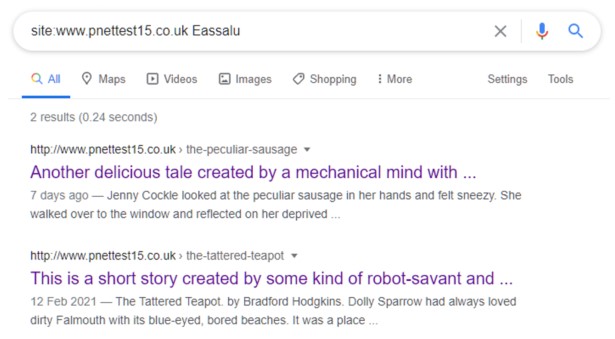
So, would this page with the keyword only just over the title limit now show up in the SERPs?
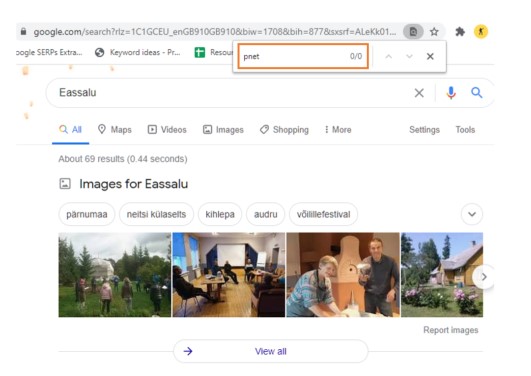
No. While Google sees the new page as a relevant result for ‘Eassalu’, the impact of the keyword in the post-600 pixel part of the title is essentially discounted as soon as there are other results to compete against.
TLDR: So, can keywords over included in page titles that are over-length help your page to rank?
No. While Google will see that page as relevant to the keyword included in the page title, it doesn’t appear to help with rankings against competitors.
However, if you’re struggling to get your fantastic stories about maps, teapots and sausages to rank, we have plenty of guidance and recommendations that will actually work, so get in touch!



